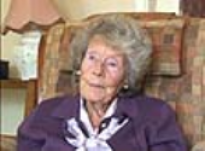Victoria Iris - Interview 30

More about me...
Despite limitations and practical difficulties Victoria Iris lives an active and independent life. She understood early on that it was up to her to cope and manage her condition. She attends a regular class based on an adapted version of ballet exercises and attends every Friday a tea dance session at her local civic hall. Her social activities also include dining out with her brother and sister-in-law and friends, church events, etc. Victoria Iris also travels by plane and ship on her own. Last year alone she went on two cruises. She flies to the Caribbean and then transfers to a cruise liner. She says that the ship’s crew is ‘brilliant’; helpful and thoughtful about her needs. In her experience she says that the most important thing is to plan ahead and make others aware of her condition and her need for assistance with such things as help with luggage throughout her journey and wheelchair service at airports.
Victoria Iris strongly believes in exercise and she goes to weekly classes which she feels do her the world of good.
Victoria Iris strongly believes in exercise and she goes to weekly classes which she feels do her the world of good.
Victoria Iris has been involved with the NOS at a national and local level for many years. She wants to encourage younger women to become involved.
Victoria Iris has been involved with the NOS at a national and local level for many years. She wants to encourage younger women to become involved.
Assistance with travelling on public transport enables Victoria Iris to travel to meetings and to go on holiday. Being able to drive helps her to be independent.
Assistance with travelling on public transport enables Victoria Iris to travel to meetings and to go on holiday. Being able to drive helps her to be independent.
Victoria Iris plans her travel by air very carefully. She recommends holidaying on a cruise ship.
Victoria Iris plans her travel by air very carefully. She recommends holidaying on a cruise ship.
Lack of pain and little discomfort meant that Victoria Iris didn't realise that she was losing height and her spine was curving. It happened gradually.
Lack of pain and little discomfort meant that Victoria Iris didn't realise that she was losing height and her spine was curving. It happened gradually.
Victoria Iris buys her clothes from one company and has them altered, which is expensive but worth it.
Victoria Iris buys her clothes from one company and has them altered, which is expensive but worth it.
Victoria Iris is expecting to get more discomfort as she gets older because her body is out of alignment.
Victoria Iris is expecting to get more discomfort as she gets older because her body is out of alignment.
Well yes because you see. I’ve mentioned to you all the ways it affects me. Well I’m not suffering because of the pain. I get discomfort and I think I’ll get more as I get older talking to my doctor last week because my body is. My, my body really is out of alignment is the word, I would thought, as I’ve got the Kyphosis so that my ribs and everything will be affecting the other parts, organs in my body. And I know that it did with mother. So that I’m prepared for that. But I still feel that sufferer is a better application as regards to me [laugh]. I’m really quite strong. I mean although they were on about patients quite a few years ago now I’ve not altered. I, I still stick to sufferer. I’m frightened to say it out loud but that’s how I feel.
What has the doctor told you about the Kyphosis and how it will affect you?
No well, I. He hasn’t told me anything but I, see I’m. I’ve been to a lot of conferences. Well I’ve been abroad quite a lot for pharmaceutical companies. They’ve sent me abroad twice, twice in Vienna, twice in Rome, one in Berlin and there’s some, one in Jersey and as well as two or three in London. And so I’ve learnt a lot from listening what’s going on to others as well. And I mean I knew from my own mother. You see she lost. If you lose the alignment it’s going to affect your organs because they’re going to be misplaced or disjointed, out of alignment. And I must say this though, one thing I’d said I’d been abroad for pharmaceutical companies but one thing and I think I might have mentioned it, that the worst patients I’ve ever seen for all kind of deformity have been men.

